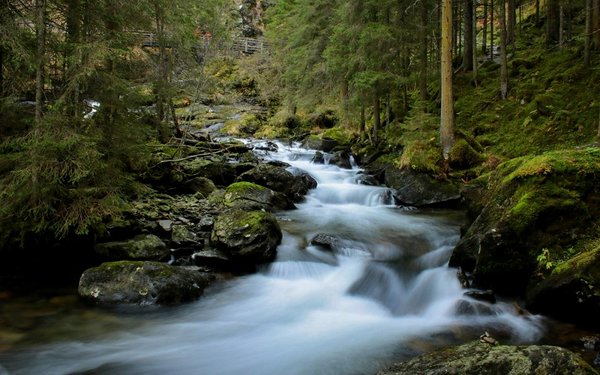 Read this article in French
Read this article in French- Share this article
- Subscribe to our newsletter
Inland waters are often overlooked
Biodiversity is declining world-wide at an unprecedented rate. Genetic diversity, populations, species, communities and ecosystems in freshwater are threatened in particular. This is impressively borne out by surveys and statistics. In inland waters, habitats are shrinking especially dramatically, for example because there is an increasing lack of oxygen at deeper levels, while surface water temperatures are rising, or because flowing waters have been blocked and dry up periodically. Climate change, with its more and more frequent weather extremes such as droughts and floods, is additionally aggravating the situation.
Flowing waters need equal attention
“International biodiversity politics continues to overlook the considerable relevance of inland waters,” criticises IGB researcher Professor Sonja Jähnig. “Springs, streams, rivers, lakes, ponds, wetlands and groundwater are indispensable prerequisites and vital foundations for nature, and therefore also for us humans. This is why inland waters and their biodiversity ought to be established as an equally important third ecological category in political and social frameworks and strategies alongside terrestrial and marine ecosystems.”
So far, rivers, lakes and wetlands have been assigned either to land areas because they are embedded in terrestrial regions or seas and oceans because they are aquatic. “Freshwater systems must no longer be handled as a secondary issue, for they can only perform their multitude of roles as habitats and key natural resources for people and for nature if they are consistently protected, sustainably managed and ecologically restored,” Jähnig summarises.
This also explicitly applies to the new Global Biodiversity Framework up to 2030, which is to be negotiated at the Montreal Conference. Its goals have to be adjusted to ensure that in restoring ecosystems and extending reserves, special goals need to be established for inland waters, Sonja Jähnig recommends together with 20 other internationally renowned freshwater experts.
Global warming cannot be combatted without biodiversity conservation
Inland waters are also neglected too often in measures against climate change. Their biodiversity is particularly strongly affected by changes in climate, for example because lakes across the world heat up more quickly than the atmosphere and the oceans – or because the flow regime of entire river systems is modified. If climate protection is not harmonised with other nature conservation goals, biodiversity can be further jeopardised, according to IGB expert Dr Martin Pusch. “The biodiversity crisis in our inland waters is closely linked to the climate crisis, for seasonal drought phases with low flow rates, increased concentrations of pollutants and high water temperatures threaten life under the water surface to a special degree,” Pusch explains.
“Especially the development of hydropower as a form of adapting to climate change poses considerable risks for aquatic biological diversity. Millions of dams and other transverse structures encourage the mass proliferation of algae in rivers and prevent fishes from seeking cool refuges in heat periods. And yet hydropower plants contribute less to mitigating climate change than expected, for especially in the tropics and subtropics, reservoirs emit large amounts of greenhouse gases themselves,” Pusch notes and therefore recommends: “Preserving aquatic biodiversity has to take precedence. We urgently need free-flowing rivers and large-scale renaturation measures instead of additional inefficient hydropower projects with their high ecological and social costs.”
Even the tiniest organisms need protection
If even great lakes and rivers slip off the radar, what about the tiniest organisms which they accommodate? Millions of microorganism species such as fungi and bacteria exist in all types of waters – in little puddles, in large inland lakes and even in ice and snow. Although most of them are not visible to the naked eye, they represent the major share of biological diversity in all ecosystems.
“These microorganisms form the basis of every food network and make a vital contribution to the roles an ecosystem plays. Let’s take fungi, for example, which re-mineralise organic material and thus retain nutrients and other compounds in the production cycle. Particularly in larger waters, they are an important factor in what is known as the biological carbon pump since they influence the sinking of organic material into the deeper reaches of waters and thus also sustainably influence the climate. In addition, they help decompose pollutants,” explains IGB microbiologist Professor Hans-Peter Grossart.
Despite microbes being of such crucial importance to the functioning of ecosystems and our health, only little is known of whether we are going to lose key species as a result of global change and how this could impact on the functioning and hence the health of our natural environment. “We reckon that the current changes in the environment are going to lead to a loss of key species and hence of ecosystems,” the IGB researcher stresses. “It is therefore absolutely necessary to include key fungus species in the list of organisms needing protection as well.” However, this will hardly be easy, for in waters, fungi are still one of the least researched groups of organisms.
(IGB/pas)
Further information:
Website of the Leibniz Institute of Freshwater Ecology and Inland Fisheries (IGB)





Add a comment
Be the First to Comment